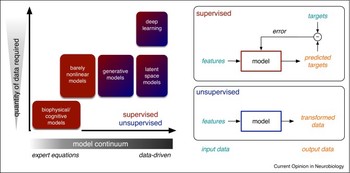In this review, we provide an accessible primer to modern modeling approaches and highlight recent data-driven discoveries in the domains of neuroimaging, single-neuron and neuronal population responses, and device neuroengineering.
Are we witnessing the dawn of post-theory science?
Prof. Beyeler was mentioned in a recent article by The Guardian.
Prof. Beyeler was mentioned in a recent article by The Guardian that discusses recent advances in machine learning and what data-driven discovery means for the classic methodology of hypothesizing, predicting, and testing.
A tougher obstacle to the new science may be our human need to explain the world – to talk in terms of cause and effect. In 2019, neuroscientists Bingni Brunton and Michael Beyeler of the University of Washington, Seattle, wrote that this need for interpretability may have prevented scientists from making novel insights about the brain, of the kind that only emerges from large datasets. But they also sympathised. If those insights are to be translated into useful things such as drugs and devices, they wrote, “it is imperative that computational models yield insights that are explainable to, and trusted by, clinicians, end-users and industry”. Laura Spinny, The Guardian
The full article can be read here.

Publications
Data-driven models in human neuroscience and neuroengineering
Bingni W. Brunton, Michael Beyeler Current Opinion in Neurobiology 58:21-29
